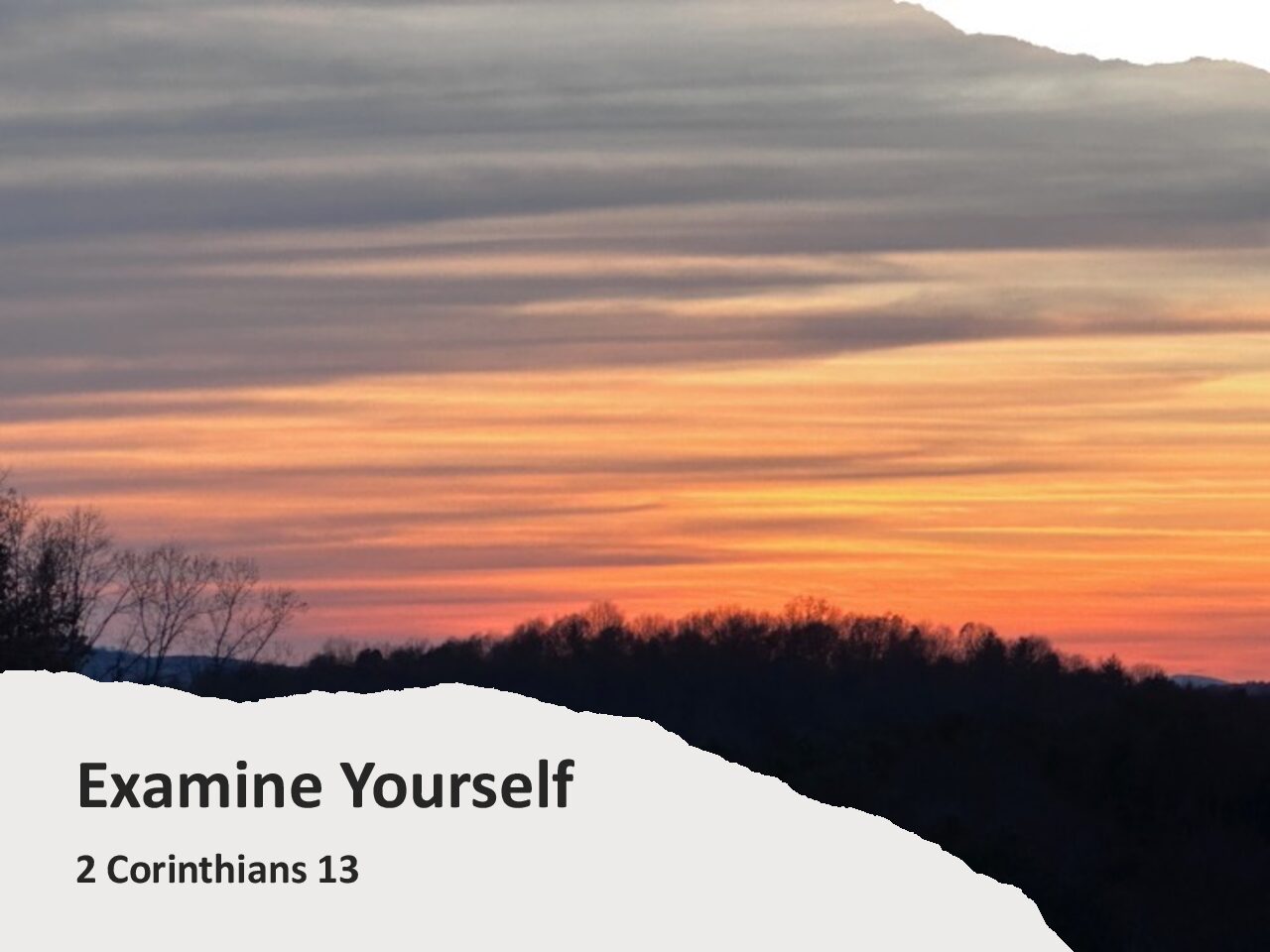Jeff Garrison
Mayberry & Bluemont Churches
November 19, 2023
2 Corinthians 13
At the beginning of worship:
When I was in school, I hated tests. I wasn’t alone, was I? But being tested allows us to see our progress and can help us do better. I prefer the tests we grade ourselves, for it showed where I need to work harder. But I also know, when taking such a test, that sooner or later, there’ll be a big test. That’s the one that counts toward the final grade.
While we, as Christians, are saved by God through Jesus Christ, we are also called to test ourselves to ensure that we’re becoming more Christ-like in our lives. And while such tests help us improve, the real goal is to be ready when we stand for the big test, the final judgment.
We’re going to talk about testing ourselves today. And when the day arrives, hopefully we’ll all be ready. After all, we have Jesus on our side.
Before reading the Scripture:
Our text last week ended with Paul concerned about his upcoming visit to Corinth. He fretted over the prospect of having to confront the Corinthians on sins they tolerate. Some of these sins were social, involving the church at large, such as quarrelling, jealously and gossip. We tend to forget that such sins are dangerous, don’t we. But they destroy relationships, which is what the church is about. Other sins were more individualist such as sexual immortality.
In today’s reading, as Paul comes to the end of this letter, he acknowledges his willingness to handle this situation. However, he would prefer the Corinthians to take care of the situation themselves and not involve him, an outsider. Paul then closes the letter with one of his most beautiful benedictions among those in his letters.
Our reading this morning begins with Paul on a serious note. It’s the equivalent of my mom saying, “You just wait till your dad gets home.” As I’ve said all along, this letter was to prepare for Paul’s visit to Corinth. This chapter begins with Paul repeating the idea of his third visit to Corinth.[1]
Paul quickly follows his travel information with a reminder of the Hebrew requirement for witnesses. To accuse someone was serious business. Capital punishment required at least two and perhaps three witnesses. And if the witnesses falsely brought charges, they stood under the same punishment as the accused.[2]
On a side note, I dislike the idea of the death penalty. However, those who call for capital punishment based on a Biblical precedent, I find it odd how they seem to forget the seriousness of perjury was in the Old Testament. If a witness (or a prosecutor or police officer) withheld or fabricated facts to obtain a conviction, according to the Bible, they’d stand under the same sentence as the accused.
But Paul, here, isn’t dealing with capital sins. Those types of punishment aren’t even in question. After all, the church didn’t have such power to carry out such punishment. That power only belonged to Rome. Instead, Paul uses the idea of witnesses in a different manner. He’s given the Corinthians three warnings (from his previous letters and visits). If they haven’t cleaned up their act by the time he arrives, he’s not going to go easy on the church in Corinth.
As he has done throughout this letter, Paul finds himself on defense. The Corinthians seem to desire proof that Christ speaks through him. Paul reminds them that while Christ works in weakness, as seen at the cross, Christ now lives in power. This is a power Christ has inferred on the church. Paul might appear weak, but he has the power of God.
In verse 5, Paul switches from the Corinthians quest to see if Paul speaks for Christ, to them searching out themselves for Christ’s presence. “Examine yourself,” he commands, “to see if you are living in the faith.” Paul challenges the Corinthians to make sure they pass the test. Interestingly, in verse 7, Paul appears to take some responsibility if they fail.
We’ve seen all along, Paul’s personally investment in the Corinthian church. He wants them to succeed and would personally accept some of the blame if they fail. By encouraging such an examination of their life in Christ, Paul sets them up to be restored in Christ. Paul hopes that before he visits, the Corinthians will be on track, and he won’t have to “be severe” in using the authority that the Lord has given him. Again, as we’ve heard earlier, Paul again repeats his desire is to build up and not tear down.[3]
Paul then brings his letter to a close. “Finally,” he says. We can almost sense Paul taking a deep breath and mumbling, “I’m done.” After all, 2nd Corinthians is his third longest work, behind Romans and 1st Corinthians. Paul continues. “Be restored, listen to my appeal; agree with one another; live in peace; and the God of peace will be with you.”
This part expresses Paul’s hope for the Corinthians and their life together.
He continues, encouraging them to greet one another with a “holy kiss.” Our culture tends to reserve kissing for romantic settings or between parents and babies. But in much of the world, including the Mediterranean region, kissing was a common way to greet one another. This would be a kiss on the cheek or the shoulder, not on the lips. Such a kiss indicated there was a bond between the two. It was a way to acknowledge kindship and familiarity. And Paul see’s it as fitting for the Corinthians to greet one another in this matter. It shows they, in Christ, are a part of the same family.
Finally, Paul ends with a trinitarian benediction. While the doctrine of the Trinity, as we know it, came later, Paul certainly understands the necessity for all the persons of the Trinity—God’s Son our Lord, God the Father and Creator, and the Holy Spirit—to be present in our Christian lives.
What happened during Paul’s third visit to the Corinthians? We don’t know. Luke tells us in Acts, that on Paul’s final visit to Greece, he spent three months there before moving on to Macedonia.[4] We can assume that at least some if not most of this time was spent in Corinth. We also know the Corinthians participated in the offering for the Jerusalem saints, which Paul focused on in the 8th and 9th chapters.[5] So it appears this letter was at least partially successful. But that’s in the past. What impact does Paul’s 2nd Epistle to the Corinthians have on us?
Over the past 20 sermons, we have observed Paul’s struggles along with the hope he has in Jesus Christ. We have seen Paul’s seriousness and (as with the “Fools Speech”) his playfulness. Paul actions reminds us that there are times for correction and times for grace. We have learned about gratitude and knowing who truly owns the world. And we have observed how he places his trust in Jesus Christ. I have enjoyed spending much time in the study of this letter, and I hope you have benefited from my work.
Paul wraps up his letter with this last section. We should take seriously Paul’s command for the Corinthians to examine themselves. Examination is a part of being a Christian. Last Fall and Spring, those who participated in Stan Ott’s workshops learned a way for us to examine ourselves at the end of the day, as we pray. We look back over our day and recall places where we could have done better and confess our sin. We also are reminded of times God showed up or we had a new experience with the divine, along with other blessings. For these, we give thanks.
Being a Christian, following Jesus, isn’t just a prayer and you’re done. It’s constantly striving to live more like Jesus in our lives. And even the best of the saints, like Paul, struggle. So, examine yourself and give thanks for God’s grace. Amen.
Commentaries consulted:
Barnett, Paul, The Second Epistle to the Corinthians, Grand Rapids, MI: Eerdmans, 1997.
Barrett, C. K., A Commentary on the Second Epistle to the Corinthians, 1973, Peabody, MA: Hendrickson, Publishing, 1987.
Best, Ernest, Second Corinthians: Interpretation, A Bible Commentary for Teaching and Preaching, Louisville, KY: John Knox Press, 1984.
[1] Paul had just said this in 2 Corinthians 12:14.
[2] Deuteronomy 19:15-19.
[3] 2 Corinthians 10:8 and 12:9.
[4] Acts 20:2-3.
[5] See Romans 15:26, where Paul speaks of the gifts from Achaia, of which Corinth was the leading city.



Faithful, excellent, and wise. Thank you!
Thank you, Rick. I’m humbled.
Truthfully, I don’t think anyone likes tests. Have a nice Thanksgiving.
Reading Fleming Rutledge’s Advent book has had me thinking a lot about that “final exam”!
I can see that–she does talk about judgment a lot. I hope you’re enjoying her book.
I definitely believe in self-examination. It pairs with self-doubt, regret, second-guessing and many other emotional struggles I know. The real trick, I think, is asking the right questions.
The right questions are helpful. In my opinion, self-exam could but doesn’t have to lead us into doubt and regret.